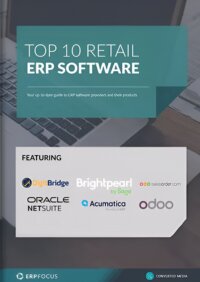Requirements gathering for retail ERP
Requirements gathering for an ERP software implementation is a major task for both business users and business analysts. In your project's lifecycle, it's one of the most critical steps as quality requirements lead to clear deliverables and straightforward test cases. Along with the essential ERP features that add value to businesses of any size and industry, it's important for business analysts or ERP consultants to dig deep into retail-specific business processes to make sure all retail ERP requirements are gathered. When gathering requirements for ERP for retail, here are some features to keep in mind that are especially important in the retail world.
Multi-channel features
In an era where the brick-and-mortar store presence is declining and online sales are taking over, retailers must offer multiple ways to buy their products to stay competitive. When using ERP full form in retail, a business can operate across many different channels such as an online marketplace, branded ecommerce site, brick-and-mortar stores, and via call center – all in a single system. The ability to buy online and pick up in-store is a multi-channel feature most retail giants (like Walmart and Target) have conditioned consumers to expect. Convenient returns policies that allow consumers to return products across channels are another way for you to edge out competitors.
While operating across multiple channels has huge advantages, each of these channels must fully integrate back to a single source system to fully reap the benefits. The ability to sell across multiple channels and have transactional data flow back to an ERP software should be considered in your requirements gathering process in ERP for retail stores.
Check out the top ERP systems for small businesses with our free guide
Offline capabilities
In a brick-and-mortar store if a customer wants to purchase something – you sell it! If the point-of-sale system goes offline for any reason, store operations must continue. Your retail ERP software should be able to support this. Imagine if you had to turn away customers paying with credit or gift cards because your POS is offline. Depending on your product sales, that could be hundreds to thousands of dollars walking out of your store! It may not be obvious at first to gather requirements for a worst-case scenario, but offline capabilities are a standard ask of many retailers and should be included in your requirements for your retail management system.
Financial reporting by store
A big advantage of ERP for retail stores is that transactional data from your stores (or any other selling channel) is fully integrated with your back-office retail accounting software. This integration makes reporting by financial quarter by store simple, as ERP software typically provides out-of-box quarterly reports. A word of advice for the requirements gathering workshops – ensure your retail accounting team is involved and provides requirements for all specific reporting needs. Oftentimes ERP software will roll up financial metrics to the legal entity level, whereas retail accountants typically report at the channel level, store level or regional level.
Ensuring your implementation is successful starts with the right selection process to meet your business needs. This is even more important as ERP research has indicated that the retail sector has the second-highest ERP usage rate with 47.4% of employees listed as system users on average. Every retailer is unique, but a solid requirements gathering session for retail ERP is critical in any implementation's success.
Free white paper

ERP Requirements template
Plan your ERP selection using our requirements template with 100 features in an editable spreadsheet. Include special requirements and extra detail in this exclusive template.

Featured white papers
Related articles
-

What do you want your new ERP system to do for you?
Is there such thing as too much functionality?
-

CMMC Compliance: What Aerospace and Defense Manufacturers Need to Know
Key insights on CMMC compliance, deadlines, and securing DoD contracts with CMMC 2.0 certificatio...
-

Integrating your ERP with POS
How can integrating your ERP with your POS help to streamline your business?


